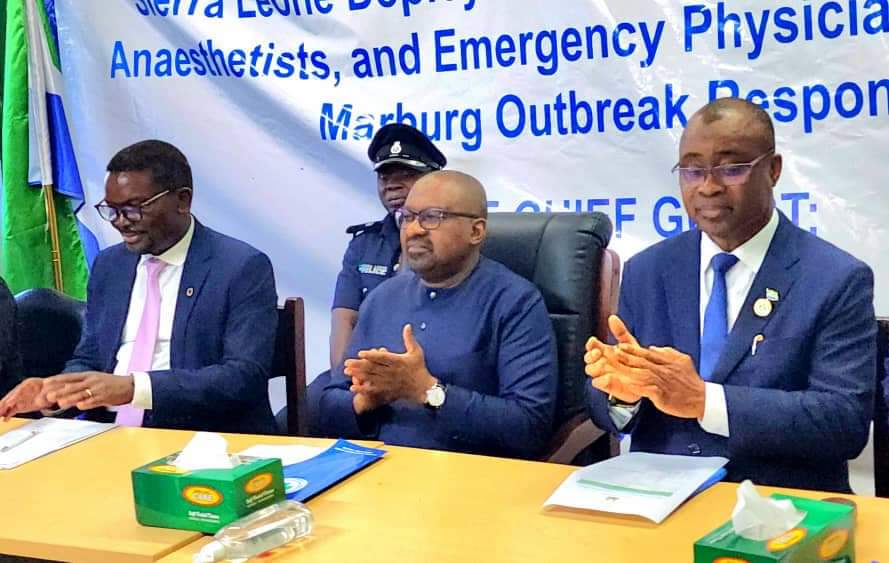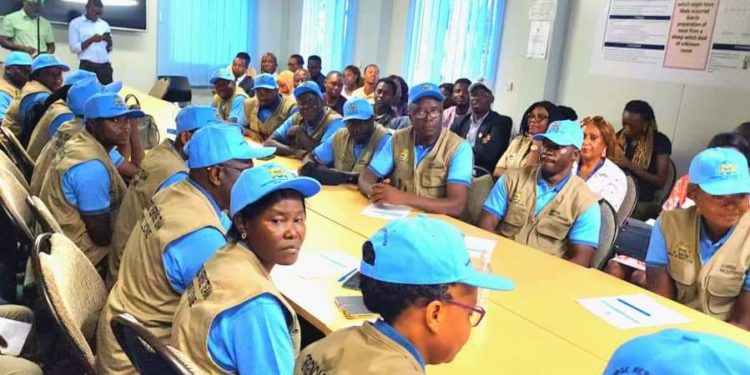By Kemo Cham
Sierra Leone is deploying some 20 medical personnel to Rwanda to help it fight an ongoing outbreak of the deadly Marburg Virus Disease (MVD).
Rwandan declared the outbreak on September 27, 2024, and it has since recorded 12 fatalities among 56 confirmed cases, as of October 7, according to data from the Rwandan Ministry of Health. Most of the victims are said to be healthcare workers.
Marburg virus, which is part of the filovirus family that also includes the Ebola virus, is known for causing severe hemorrhagic fever. It is an often fatal disease with symptoms similar to Ebola, which ravaged Sierra Leone and its Mano River Union neighbors Guinea and Liberia from 2014 to 2016.
The National Public Health Agency (NPHA) of Sierra Leone said the medical team being deployed will provide vital training, resources, and care to affected Rwandees.
Vice President Dr. Mohamed Juldeh Jalloh officially bade farewell to the team on Monday, according to a post on his facebook, which revealed that the team will support the Rwandan response in case management.
A news released shared on the facebook page of the NPHA said the mission being conducted in collaboration with the Ministry of Health and WHO is a demonstration of the Government’s “commitment to global health security.”
This is the first outbreak of the Marburg Virus disease in Rwanda. And the authorities say the source of it is still under investigation.
First discovered in a laboratory in Germany in 1967, Marburg is believed to have originated from the African green monkey.
But outbreaks among larger human populations have been reported mostly in Sub-Saharan Africa, including in the Democratic Republic of Congo, Uganda, Tanzania, Angola, Kenya and South Africa. Most recent outbreaks were reported in Equatorial Guinea and Tanzania between February and June 2023, where nine cases were reported, including six deaths.
The outbreak in Angola in 2005 remains the largest so far, with over 300 fatalities, according to Angolan Ministry of Health data cited by the World Health Organization (WHO).
Some studies have indicated that outbreaks have typically occurred when people came in contact with infected green monkeys, pigs or Egyptian rousette bats – a common carrier of the virus. These bats are often found in mines and caves.
In 2018, Sierra Leonean and United States scientists found bats infected with the virus separately in three different Sierra Leonean districts – Moyamba, Koinadugu and Kono. It was said to be the first time the virus had been detected in West Africa. And since then, outbreaks of the viral disease in humans have been reported in Guinea in 2021 and in Ghana in 2022.

Vice President Dr Mohamed Juldeh Jalloh, flanked by WHO Country Representative Dr. Innocent Bright Nuwagira and Deputy Minister of Health 1 in the Ministry of Health, Dr. Charles Senessie. Image, Office of the Vice President of Sierra Leone.
Epidemiologists says once the MVD jumps from an infected animal to a human, which is known as zoonotic spillover, it can spread from person to person through bodily fluids or by contact with contaminated surfaces.
There are no antiviral drugs to treat people infected with Marburg. Patients are kept hydrated and blood loss is replaced through transfusion.
On Tuesday the Africa Centers for Disease Control and Prevention (Africa CDC) announced a donation of a consignment of 5,100 vials of remdesivir, the antiviral drug used to treat Covid-19. The drugs were donated by Gilead Sciences, Inc..
The Africa CDC said it negotiated the donation that aims to provide treatment to those affected by the virus. The continental health agency said it also collaborated with the Ministry of Health of Rwanda to deploy senior response leaders to Kigali to assist with surveillance, lab testing, and research.
“While there is no approved cure for MVD, remdesivir is being supplied for emergency use as global vaccine and therapeutic trials, led by WHO, are underway,” the agency said.
Reports indicate that some seven hundred doses of an experimental vaccine against the virus have been shipped from the US as part of a clinical trial.
The World Health organization on Tuesday, October 8, issued an appeal for a US$ 7.7 million from October to December 2024 to support the Government of Rwanda in controlling the MVD outbreak. This funding will enable WHO to carry out critical activities outlined in its strategic response plan, focusing on surveillance, infection prevention, community engagement, and cross-border collaboration, it said.
This outbreak comes as the continent battles an Mpox virus epidemic, which has particularly ravaged the Democratic Republic of Congo and neighboring countries.






















